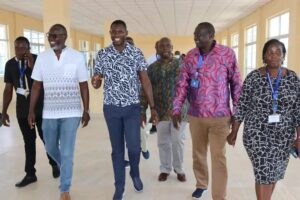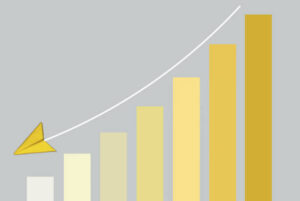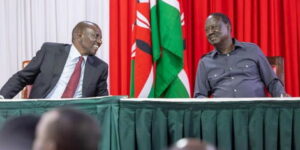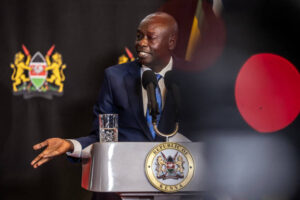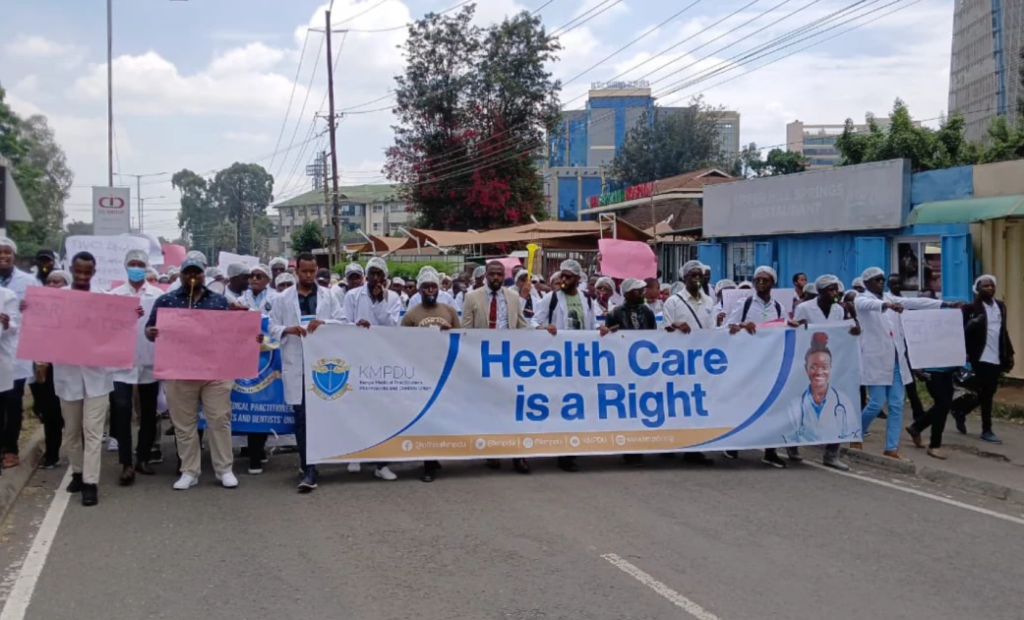
By Derrick Wanjala
In an alarming turn of events, Medics for Kenya, a group dedicated to providing medical support during protests, has ceased its operations due to escalating safety concerns.

This decision follows the infiltration of demonstrations by violent elements and a shifting, increasingly dangerous protest environment. Volunteers have reported heightened fears for their safety, especially from police forces.
Last week, amid a chaotic scene filled with tear gas and the sound of live and rubber bullets, 23-year-old Zaha Indi made a courageous attempt to reason with the police. Positioned at a makeshift medical camp within the Holy Family Basilica, Zaha and her fellow volunteers provided crucial first aid to injured protesters, preparing them for transport to hospitals. Their efforts were repeatedly disrupted by tear gas canisters launched into the church compound by police forces.
During a particularly tense moment, Zaha approached the police, seeking a halt to the tear gas bombardment. The response she received was chilling and left her stunned. “The officer told me to go back and wait for more bodies to treat,” she recounted, still haunted by the encounter. The words echoed in her mind, a stark reminder of the harsh reality on the ground.
Despite her shock and disillusionment, Zaha returned to the church, resolute in her mission to aid as many as possible. She emphasized the non-discriminatory nature of their efforts, providing care to both protesters and injured police officers alike. However, the pervasive hostility and indifference from law enforcement left a lasting impact.
One week later, Zaha has not returned to the streets. Her experience, though harrowing, is not isolated. Medics for Kenya has formally announced the suspension of its services, citing the increasingly perilous conditions for its volunteers. The group’s statement highlighted the deployment of goons and a general deterioration of the protest atmosphere as key factors in their decision.
The collective, consisting of volunteer doctors, nurses, clinical officers, psychologists, and other medical professionals, has been a vital presence in the “Reject and Occupy” protests. Their departure marks a significant blow to the movement, leaving many without immediate medical assistance during violent clashes.
The withdrawal of Medics for Kenya underscores the escalating dangers faced by both protesters and those providing humanitarian aid. The situation raises urgent questions about the protection of medical volunteers and the broader implications for civil liberties in the context of political demonstrations. As the country grapples with these issues, the voices of individuals like Zaha Indi highlight the human cost of these tumultuous times.
The presence of Medics for Kenya at protests had been a beacon of hope for many demonstrators. Their withdrawal not only signals a decline in available medical assistance but also reflects the increasing volatility of the protest environments. The safety of volunteers has become a paramount concern, overshadowing their commitment to humanitarian aid.
Volunteers have shared harrowing stories of their experiences on the frontlines. Many, like Zaha, have faced direct threats and intimidation from law enforcement. The fear of becoming targets themselves has forced them to reconsider their involvement, despite their dedication to providing medical care to all in need.
The infiltration of protests by violent elements has further complicated the situation. Peaceful demonstrators are now caught between aggressive police tactics and the disruptive actions of these goons. This has created a highly volatile environment where medical volunteers are at risk from multiple fronts.
Medics for Kenya’s decision to withdraw is a stark reflection of the deteriorating conditions on the ground. The group had been instrumental in offering first aid and emergency care, often working under extremely challenging circumstances. Their absence leaves a significant void in the support system for injured protesters.
In their statement, Medics for Kenya emphasized the importance of safety for their volunteers. The group’s leadership acknowledged the difficult decision but stressed that the safety of their members could no longer be compromised. This decision has been met with mixed reactions from the public and other civil society organizations.
Human rights groups have expressed concern over the withdrawal, noting that it highlights the broader issue of shrinking civic space in Kenya. They argue that the safety of medical volunteers should be guaranteed by the state, allowing them to perform their duties without fear of reprisal or harm.
The withdrawal also raises questions about the future of protest movements in Kenya. Without medical support, the risk to demonstrators increases significantly. This could deter participation and weaken the overall impact of these movements, which rely on large numbers of participants to voice their demands effectively.
For Zaha Indi and her fellow volunteers, the decision to cease operations is a bitter pill to swallow. Many had joined Medics for Kenya out of a deep sense of duty and compassion, willing to put themselves in harm’s way to help others. The reality of being unable to continue this work is a heavy burden to bear.
The experiences of volunteers like Zaha have shed light on the severe challenges faced by those who step up to provide aid during protests. Their stories are a testament to the bravery and resilience of individuals committed to humanitarian principles, even in the face of great danger.
As the country reflects on the implications of Medics for Kenya’s withdrawal, there is a growing call for better protection measures for all involved in protests. Ensuring the safety of medical volunteers and peaceful demonstrators must become a priority to uphold the rights to health and peaceful assembly.
Medics for Kenya’s departure from the protest scenes marks a significant turning point. It underscores the urgent need for dialogue and action to address the root causes of violence and ensure that humanitarian aid can be delivered safely and effectively in times of civil unrest.
The stories of Zaha and her colleagues will continue to resonate, serving as a powerful reminder of the human impact of political strife. Their courage and dedication highlight the essential role of medical volunteers in safeguarding lives and upholding human dignity, even amidst chaos.
In conclusion, the decision by Medics for Kenya to withdraw from providing medical support during protests is a sobering reminder of the escalating dangers faced by volunteers and demonstrators alike. It calls for immediate action to protect those who risk their lives to offer humanitarian aid and underscores the need for a safer, more supportive environment for civil protest in Kenya.


